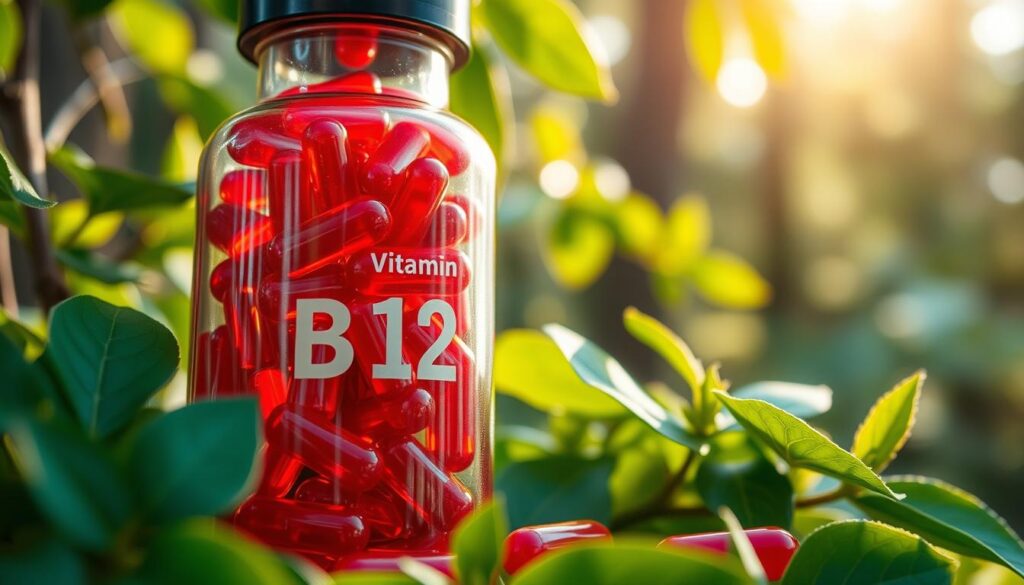Vitamin B12, or Cobalamin, is crucial for your overall health. It supports your nervous system and blood cells. Most Americans get enough B12 from their diet, but knowing its importance can help you eat better1.
Cyanocobalamin is the most common B12 supplement. It helps prevent deficiencies that can affect your health. Adults usually need 2.4 mcg of B12 daily2.
Your body can store up to 2,000 times the typical daily intake. This creates a large reserve of this vital nutrient1.
Doctors measure B12 levels in blood serum or plasma. Levels below 200 or 250 pg/mL are considered low2. High methylmalonic acid or homocysteine levels may also indicate a deficiency2.
Key Takeaways
- Vitamin B12 is crucial for overall health and bodily functions
- Most Americans get sufficient B12 through diet
- Supplements can help prevent potential deficiencies
- Body stores large amounts of B12 for future use
- Professional testing can accurately assess B12 levels
Understanding Cyanocobalamin and Its Role in Your Body
Cyanocobalamin, a form of vitamin B12, is crucial for your health. It supports many bodily functions that keep you energized and at your best3.
Essential Functions in DNA Synthesis
Your body needs cyanocobalamin for key metabolic processes. It helps produce enzymes, supporting DNA synthesis and red blood cell formation3.
The nutrient converts homocysteine to methionine. This process creates universal methyl donors that affect various cellular functions.
Absorption and Metabolism Process
Vitamin B12 absorption is complex and requires several steps. Your body needs intrinsic factor, a stomach protein, to absorb cyanocobalamin properly3.
Cyanocobalamin is a synthetic form of vitamin B12. It’s often found in supplements and fortified foods3.
- Naturally found in animal products
- Requires intrinsic factor for absorption
- Critical for metabolism and cell production
Recommended Daily Intake Levels
Your daily cyanocobalamin needs depend on age and health. Adults usually need 2.4 mcg per day. Pregnant women require slightly more4.
People with vitamin B12 deficiency might need extra supplements. This can prevent potential health issues3.
“Understanding your body’s vitamin B12 needs is key to maintaining optimal health and preventing deficiencies.”
Strict vegans or those with absorption issues may need special B12 supplements. This ensures they meet their nutritional needs4.
Natural Sources and Supplementation Options
Cyanocobalamin sources can boost your nutrition intake. Vitamin B12 is mostly in animal products, making it vital for meat-eaters but tricky for vegetarians5. The daily recommendation is 2.4 micrograms, with higher amounts for pregnant or nursing people5.
- Lamb liver (3,571% Daily Value per 3.5-ounce serving)5
- Clams (over 7,000% DV in 20 small clams)5
- Sardines (554% DV in 1-cup serving)5
- Beef (467% DV in one grilled steak)5
Plant-based eaters have fortified options too. Nutritional yeast packs 733% of the Daily Value in just two tablespoons5. Fortified cereals offer up to 62% DV per cup5.
| Food Source | Daily Value % |
|---|---|
| Lamb Liver | 3,571% |
| Clams | 7,000% |
| Nutritional Yeast | 733% |
| Beef | 467% |
Supplements are key for those with limited dietary sources. B12 supplements boost plasma B12 levels, especially in vegans and vegetarians6. Your doctor can help choose the best method: oral supplements, sublingual tablets, or B12 shots.
Remember, your individual nutritional needs may vary based on diet, age, and health conditions.
Conclusion
Vitamin B12 plays a crucial role in nutrition and wellness. Cyanocobalamin supports DNA synthesis and maintains a healthy nervous system7. Recognizing B12 deficiency risks is vital, as it can cause depression, confusion, and nerve damage7.
Research shows various ways to absorb cyanocobalamin. A pharmacokinetics study found that newer formulations have improved bioavailability7. This breakthrough offers more effective options for maintaining optimal B12 levels.
Your health strategy should include proper cyanocobalamin intake. Investing in nutritional health is crucial, despite varying supplement costs8. Ensure adequate B12 through diet, supplements, or advanced methods to support overall well-being.
FAQ
What exactly is cyanocobalamin?
How does cyanocobalamin get absorbed by the body?
Who is most at risk of cyanocobalamin deficiency?
What are the best food sources of cyanocobalamin?
How much cyanocobalamin do I need daily?
What are the different ways to take cyanocobalamin supplements?
What are the signs of vitamin B12 deficiency?
Source Links
- Office of Dietary Supplements – Vitamin B12 – https://ods.od.nih.gov/factsheets/VitaminB12-Consumer/
- Office of Dietary Supplements – Vitamin B12 – https://ods.od.nih.gov/factsheets/VitaminB12-HealthProfessional/
- Understanding B12: Hydroxocobalamin vs. Cyanocobalamin – Seattle Beauty – https://seattlebeauty.org/understanding-b12-hydroxocobalamin-vs-cyanocobalamin/
- Cyanocobalamin Injection: MedlinePlus Drug Information – https://medlineplus.gov/druginfo/meds/a605007.html
- Vitamin B12 Foods: 12 Great Sources – https://www.healthline.com/nutrition/vitamin-b12-foods
- Foods and Supplements Associated with Vitamin B12 Biomarkers among Vegetarian and Non-Vegetarian Participants of the Adventist Health Study-2 (AHS-2) Calibration Study – https://pmc.ncbi.nlm.nih.gov/articles/PMC6024521/
- Cyanocobalamin/Salcaprozate Sodium: A Novel Way to Treat Vitamin B12 Deficiency and Anemia – https://jhoponline.com/issue-archive/2016-issues/jhop-june-2016-vol-6-no-2/16797-cyanocobalamin-salcaprozate-sodium-a-novel-way-to-treat-vitamin-b12-deficiency-and-anemia
- PDF – https://www.lancsmmg.nhs.uk/media/1384/cyanocobalamin-tablets-updated-with-exception.pdf
